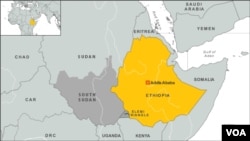ADDIS ABABA —
Ethiopian Muslims will elect a new Islamic Council this Sunday, October 7. The election has stirred protest among many Muslims who believe the government is trying to influence the Council.
A protest erupted after the Friday prayer at the Anwar mosque, the largest mosque in Addis Ababa. People were waving yellow papers, symbolizing a warning card for the government and the crowd was chanting for about 20 minutes, shouting slogans such as “let our voice be heard” and “release the prisoners.” Dozens of protesters were brought to a police station during and after the demonstration.
The anger behind the protest started earlier this year, as some Muslims accused the government of interfering with religious affairs by trying to promote a more liberal form of Islam from Lebanon, known as al-Abhash. More than 100 people were detained in previous protests and many of them are believed to still be behind bars.
Government spokesman Shimelis Kemal says that most demonstrators have been misinformed about the situation.
“Many people who had been confused or had been misinformed joined this protest," he said. "The government has no right under our constitution to set up Islamic elections or to interfere in any religious matters.”
Shimelis also says accusations that the government is trying to interfere in religious affairs are fabrications started by extremist groups.
”These extremist groups in Ethiopia are exploiting the situation in order to advance their hidden agendas," the spokesman said. "They started all kinds of accusations, stating that the government is using its institutions to coerce and to systemically wipe out Islamic religion from Ethiopia. And even stated that all the developmental activities are targeted at diminishing the Muslims in Ethiopia. This was a wild accusation.”
Some Ethiopian Muslims mentioned that they feel pressured to vote on Sunday as people from local government are going door to door. For the first time, Muslims will have to vote in their districts instead of in the mosques. Representatives of the districts are allegedly telling Muslims that not voting will have consequences.
Shimelis says that these accusations are false as well and that it’s the extremist groups that are threatening the Muslim community, as they want more power.
”Controlling such an institution would help legitimize, theological legitimize, its activities,” he said.
Members of the Islamic Council committee preferred not to comment on the matter.
Ethiopia has often been praised for being a peaceful multi-religious nation. According to government statistics, the majority of Ethiopians are Christian, while about one-third of the population is Muslim.
A protest erupted after the Friday prayer at the Anwar mosque, the largest mosque in Addis Ababa. People were waving yellow papers, symbolizing a warning card for the government and the crowd was chanting for about 20 minutes, shouting slogans such as “let our voice be heard” and “release the prisoners.” Dozens of protesters were brought to a police station during and after the demonstration.
The anger behind the protest started earlier this year, as some Muslims accused the government of interfering with religious affairs by trying to promote a more liberal form of Islam from Lebanon, known as al-Abhash. More than 100 people were detained in previous protests and many of them are believed to still be behind bars.
Government spokesman Shimelis Kemal says that most demonstrators have been misinformed about the situation.
“Many people who had been confused or had been misinformed joined this protest," he said. "The government has no right under our constitution to set up Islamic elections or to interfere in any religious matters.”
Shimelis also says accusations that the government is trying to interfere in religious affairs are fabrications started by extremist groups.
”These extremist groups in Ethiopia are exploiting the situation in order to advance their hidden agendas," the spokesman said. "They started all kinds of accusations, stating that the government is using its institutions to coerce and to systemically wipe out Islamic religion from Ethiopia. And even stated that all the developmental activities are targeted at diminishing the Muslims in Ethiopia. This was a wild accusation.”
Some Ethiopian Muslims mentioned that they feel pressured to vote on Sunday as people from local government are going door to door. For the first time, Muslims will have to vote in their districts instead of in the mosques. Representatives of the districts are allegedly telling Muslims that not voting will have consequences.
Shimelis says that these accusations are false as well and that it’s the extremist groups that are threatening the Muslim community, as they want more power.
”Controlling such an institution would help legitimize, theological legitimize, its activities,” he said.
Members of the Islamic Council committee preferred not to comment on the matter.
Ethiopia has often been praised for being a peaceful multi-religious nation. According to government statistics, the majority of Ethiopians are Christian, while about one-third of the population is Muslim.




